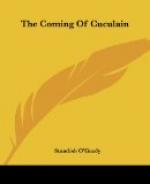“Surely it is not that stripling?” said Loegairey. But the King made no answer.
On the morrow there was a great hosting of the Red Branch on the plain of the Assemblies. It was May-Day morning and the sun shone brightly, but at first through radiant showers. The trees were putting forth young buds; the wet grass sparkled. All the martial pomp and glory of the Ultonians were exhibited that day. Their chariots and war-horses ringed the plain. All the horses’ heads were turned towards the centre where were Concobar Mac Nessa and the chiefs of the Red Branch. The plain flashed with gold, bronze, and steel, and glowed with the bright mantles of the innumerable heroes, crimson and scarlet, blue, green, or purple. The huge brooches on their breasts of gold and silver or gold-like bronze, were like resplendent wheels. Their long hair, yellow for the most part, was bound with ornaments of gold. Great, truly, were those men, their like has not come since upon the earth. They were the heroes and demigods of the heroic age of Erin, champions who feared nought beneath the sun, mightiest among the mighty, huge, proud, and unconquerable, and loyal and affectionate beyond all others; all of the blood of Ir, [Footnote: On account of their descent from Ir, son of Milesius, the Red Branch were also called the Irians.] son of Milesius, the Clanna Rury of great renown, rejoicing in their valour, their splendour, their fame and their peerless king. Concobar had no crown. A plain circle of beaten gold girt his broad temples. In the naked glory of his regal manhood he stood there before them all, but even so a stranger would have swiftly discovered the captain of the Red Branch, such was his stature, his bearing, such his slowly-turning, steady-gazing eyes and the majesty of his bearded countenance. His countenance was long, broad above and narrow below, his nose eminent, his beard bipartite, curling and auburn in hue, his form without any blemish or imperfection.
Cuculain came forth from the palace. He wore that day a short mantle of pale-red silk bordered with white thread and fastened on the breast with a small brooch like a wheel of silver. The hues upon that silk were never the same. His tunic of fine linen was girt at the waist with a leathern zone, stained to the resemblance of the wild-briar rose. It descended to but did not pass his beautiful knees, falling into many plaits. The tunic was cut low at the neck, exposing his throat and the knot in the throat and the cup-shaped indentation above the breast. On his feet were comely shoes sparkling with bronze plates. They took the colour of everything which they approached. His hair fell in many curls over the pale-red mantle, without adornment or confinement. It was the colour of the flower which is named after the dearest Disciple, but which was called sovarchey by the Gael. A tinge of red ran through the gold. As to his eyes, no two men or women could agree concerning




